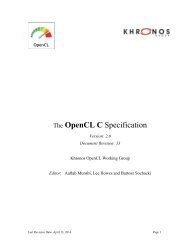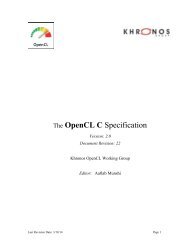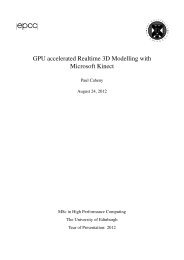An Introduction to OpenCL C++
i1a4Lv
i1a4Lv
You also want an ePaper? Increase the reach of your titles
YUMPU automatically turns print PDFs into web optimized ePapers that Google loves.
<strong>An</strong> <strong>Introduction</strong> <strong>to</strong> <strong>OpenCL</strong> <strong>C++</strong><br />
AJ Guillon, YetiWare Inc.<br />
© Copyright 2015, The Khronos Group Inc.
<strong>An</strong> <strong>Introduction</strong> <strong>to</strong> <strong>OpenCL</strong> <strong>C++</strong> 1<br />
1 About <strong>OpenCL</strong><br />
Today servers, desk<strong>to</strong>ps, mobile devices, and embedded systems contain many processors in addition <strong>to</strong> the<br />
CPU that runs programs. These extra processors are generally called accelera<strong>to</strong>rs and could be a GPU,<br />
FPGA, Xeon Phi, or other programmable device. There are many types of accelera<strong>to</strong>rs available, from<br />
many vendors, for many different environments. Khronos developed the <strong>OpenCL</strong> standard so that an application<br />
can offload parallel computation <strong>to</strong> accelera<strong>to</strong>rs in a common way, regardless of their underlying<br />
architecture or programming model. <strong>OpenCL</strong>-enabled software can obtain peak performance by using every<br />
<strong>OpenCL</strong>-enabled parallel processor and accelera<strong>to</strong>r on the system <strong>to</strong>gether at the same time.<br />
<strong>OpenCL</strong> provides a unique abstraction of the computing system, as depicted below.<br />
The host is an abstraction that defines where an application is executed, and for most developers this is<br />
going <strong>to</strong> be the operating system and CPU. The host can access devices that support <strong>OpenCL</strong>, such as<br />
accelera<strong>to</strong>rs or the host CPU itself. <strong>OpenCL</strong> provides a common hardware abstraction for devices that<br />
includes a hardware model, memory model, and parallel execution model. Devices cannot run traditional<br />
C or <strong>C++</strong> programs, instead <strong>OpenCL</strong> provides kernel languages that are used <strong>to</strong> write programs that can<br />
run on <strong>OpenCL</strong> devices.<br />
There are several logical components of <strong>OpenCL</strong> from the point of view of the software developer, as<br />
depicted below.
<strong>An</strong> <strong>Introduction</strong> <strong>to</strong> <strong>OpenCL</strong> <strong>C++</strong> 2<br />
The application runs on the host, and can use a standard C API <strong>to</strong> manage <strong>OpenCL</strong> devices directly or<br />
rely on middleware <strong>to</strong> do the management. Applications or middleware are responsible for discovering<br />
devices, managing device memory, and compiling and running device programs. <strong>OpenCL</strong> standardizes how<br />
the host calls device programs, and how memory is transferred between host and device.<br />
The <strong>OpenCL</strong> kernel languages are based on traditional languages with the minimal possible changes <strong>to</strong><br />
enable parallel processing for maximum performance and portability across devices. The kernel languages<br />
are defined through restrictions and enhancements <strong>to</strong> standard languages so that the kernel compilers can<br />
generate optimized code. Khronos designed a modified version of C for devices called <strong>OpenCL</strong> C, and<br />
now Khronos has modified <strong>C++</strong> <strong>to</strong> create <strong>OpenCL</strong> <strong>C++</strong>.<br />
The <strong>OpenCL</strong> standard has been developed iteratively through several versions, each adding new features<br />
culminating in <strong>OpenCL</strong> 2.1. This latest provisional release introduces a new <strong>OpenCL</strong> <strong>C++</strong> kernel language<br />
along with SPIR-V, a common intermediate representation (IR) for compute and graphics that is shared<br />
with the Vulkan graphics API. Developers can now write device programs using <strong>OpenCL</strong> <strong>C++</strong>, which<br />
is based on <strong>C++</strong>14, and compile these programs <strong>to</strong> a SPIR-V representation that can then be loaded for<br />
execution by the device. The motivations behind these changes will be described in this white paper.<br />
2 Why <strong>OpenCL</strong> <strong>C++</strong> ?<br />
Previous versions of <strong>OpenCL</strong> have featured <strong>OpenCL</strong> C, based upon the C programming language. The<br />
provisional <strong>OpenCL</strong> 2.1 specification is the first <strong>OpenCL</strong> version <strong>to</strong> feature a kernel language based upon<br />
<strong>C++</strong>. The relative advantages and disadvantages of C and <strong>C++</strong> are already well known, and <strong>OpenCL</strong> <strong>C++</strong><br />
inherits many of them. The <strong>OpenCL</strong> working group has responded <strong>to</strong> developers’ requests <strong>to</strong> be able <strong>to</strong><br />
write high-level abstractions enabled by <strong>C++</strong>, while maintaining some compatibility with <strong>OpenCL</strong> C, by<br />
providing the <strong>OpenCL</strong> <strong>C++</strong> kernel language.<br />
<strong>OpenCL</strong> <strong>C++</strong> provides library developers with powerful facilities for abstraction so that high-level libraries<br />
and containers can be implemented on the device itself. <strong>An</strong> <strong>OpenCL</strong> <strong>C++</strong> library might provide a very<br />
simple interface <strong>to</strong> developers that internally relies upon sophisticated template metaprogramming techniques<br />
<strong>to</strong> provide peak performance on the target hardware. The <strong>OpenCL</strong> working group will ensure that<br />
<strong>OpenCL</strong> <strong>C++</strong> provides the right language features <strong>to</strong> enable innovative high-level libraries and containers.<br />
3 What About <strong>OpenCL</strong> C?<br />
It is not possible <strong>to</strong> provide <strong>OpenCL</strong> C as a subset of <strong>OpenCL</strong> <strong>C++</strong> because some features and types cannot<br />
be supported in <strong>OpenCL</strong> <strong>C++</strong>. Khronos realizes that not every programmer will wish <strong>to</strong> migrate from<br />
<strong>OpenCL</strong> C <strong>to</strong> <strong>OpenCL</strong> <strong>C++</strong> and so <strong>OpenCL</strong> C is still fully supported in <strong>OpenCL</strong> 2.1. Developers can opt<br />
<strong>to</strong> write <strong>OpenCL</strong> C-style code using <strong>OpenCL</strong> <strong>C++</strong> if they choose.<br />
4 How Are <strong>OpenCL</strong> <strong>C++</strong> and SPIR-V Related?<br />
Previous <strong>OpenCL</strong> versions required that the <strong>OpenCL</strong> implementation have a built-in <strong>OpenCL</strong> C compiler 1 .<br />
Developers called clCreateProgramWithSource and passed in an <strong>OpenCL</strong> C program as a string.<br />
A compiler within the implementation would then build and return a handle <strong>to</strong> the compiled program. This<br />
approach requires that every <strong>OpenCL</strong> implementation contain an <strong>OpenCL</strong> C compiler, and any bug in the<br />
<strong>OpenCL</strong> C compiler would affect the stability of the entire implementation.<br />
This design had several issues.<br />
1 With the exception of the embedded profile
<strong>An</strong> <strong>Introduction</strong> <strong>to</strong> <strong>OpenCL</strong> <strong>C++</strong> 3<br />
The first issue was that applications were forced <strong>to</strong> ship <strong>OpenCL</strong> C source code or platform specific binaries.<br />
Some application developers would prefer a program representation that requires effort and intent<br />
<strong>to</strong> disassemble. Although <strong>OpenCL</strong> implementations may support loading a program from a binary representation,<br />
the binary might not be obfuscated, and it would be device specific. This reduces application<br />
portability.<br />
The second issue was that <strong>OpenCL</strong> implementations and drivers became rather complicated because of<br />
the imposed requirement for them <strong>to</strong> contain an <strong>OpenCL</strong> C compiler. This made it hard <strong>to</strong> test <strong>OpenCL</strong><br />
implementations and difficult <strong>to</strong> ensure that implementations shipped in devices were correct. It can be<br />
extremely difficult, or impossible, <strong>to</strong> update <strong>OpenCL</strong> implementations in some hardware environments.<br />
Developers might be forced <strong>to</strong> restructure their <strong>OpenCL</strong> C code <strong>to</strong> work around issues in specific <strong>OpenCL</strong><br />
versions on specific devices.<br />
<strong>OpenCL</strong> 2.1 addresses these issues by changing how <strong>OpenCL</strong> programs are compiled and by introducing<br />
SPIR-V.<br />
SPIR-V is a low-level representation of an <strong>OpenCL</strong> program that is designed <strong>to</strong> be easily loaded by an<br />
<strong>OpenCL</strong> implementation. It has been designed <strong>to</strong> eliminate both of the design issues mentioned. SPIR-V<br />
is not source code so a reverse engineer would have <strong>to</strong> take several intentional steps <strong>to</strong> obtain proprietary<br />
software information, and would not obtain the original source code. SPIR-V is also designed <strong>to</strong> split a<br />
compiler in<strong>to</strong> two parts in such a way that <strong>OpenCL</strong> implementations are easier <strong>to</strong> test. This design enhances<br />
implementation stability.<br />
<strong>An</strong> <strong>OpenCL</strong> <strong>C++</strong> compiler is not a required part of an <strong>OpenCL</strong> 2.1 implementation. This means that an<br />
<strong>OpenCL</strong> implementation does not have <strong>to</strong> contain a compiler <strong>to</strong> be conformant. Instead, developers will<br />
call clCreateProgramWithIR and pass in a SPIR-V program that the implementation will: load,<br />
transform <strong>to</strong> device specific code, optimize, and return a handle <strong>to</strong> the program. Developers will use an<br />
external <strong>OpenCL</strong> <strong>C++</strong> compiler that will compile <strong>OpenCL</strong> <strong>C++</strong> <strong>to</strong> SPIR-V.<br />
So where do you get an <strong>OpenCL</strong> <strong>C++</strong> compiler? There are a few possibilities:<br />
• Vendors may ship an <strong>OpenCL</strong> <strong>C++</strong> compiler that generates SPIR-V as part of their SDK<br />
• Khronos is considering providing an open source <strong>OpenCL</strong> <strong>C++</strong> compiler available under a permissive<br />
license<br />
• Independent <strong>to</strong>ols vendors might develop and provide their own optimizing <strong>OpenCL</strong> <strong>C++</strong> compilers for<br />
use across multiple <strong>OpenCL</strong> runtime implementations<br />
SPIR-V and the compilation changes in <strong>OpenCL</strong> 2.1 have opened up many possibilities for the software<br />
ecosystem. If an <strong>OpenCL</strong> <strong>C++</strong> compiler is available as a library with an API, then it could be linked in<strong>to</strong><br />
applications. This means that developers could ship <strong>OpenCL</strong> <strong>C++</strong> source code and compile it in the same<br />
way that they did with previous <strong>OpenCL</strong> versions by using the compiler library.<br />
There are additional reasons <strong>to</strong> use a separate <strong>OpenCL</strong> <strong>C++</strong> compiler that targets SPIR-V, instead of requiring<br />
that implementations contain an <strong>OpenCL</strong> <strong>C++</strong> compiler.<br />
One reason is <strong>to</strong> ensure that devices can load programs relatively quickly 2 . <strong>OpenCL</strong> <strong>C++</strong> programs that<br />
leverage template metaprogramming can take a significant amount of time <strong>to</strong> compile, and loading SPIR-V<br />
will likely be faster than instantiating complex templates at runtime.<br />
2 With the potential exception of FPGAs
<strong>An</strong> <strong>Introduction</strong> <strong>to</strong> <strong>OpenCL</strong> <strong>C++</strong> 4<br />
<strong>An</strong>other reason <strong>to</strong> prefer a separate <strong>OpenCL</strong> <strong>C++</strong> compiler is <strong>to</strong> insulate the application from any potential<br />
<strong>OpenCL</strong> <strong>C++</strong> compiler issues. Developers can do unit testing on their SPIR-V code with the assurance<br />
that their distributed programs will be loaded in a simple manner with some optimization passes. Alternatively,<br />
developers might have <strong>to</strong> work around compiler bugs and test specific <strong>OpenCL</strong> <strong>C++</strong> compiler<br />
versions.<br />
Traditionally, <strong>C++</strong> header library developers had <strong>to</strong> deal with many compilers that each supported a subset<br />
of the complete <strong>C++</strong> language. With <strong>OpenCL</strong> <strong>C++</strong>, Khronos tests compilers for conformance <strong>to</strong> ensure<br />
they properly adhere <strong>to</strong> the specification. This means that any conformant <strong>OpenCL</strong> <strong>C++</strong> compiler will<br />
support a common set of language features as validated by conformance testing. It is still possible for a<br />
compiler <strong>to</strong> contain bugs because conformance testing cannot guarantee correctness, and this is why SPIR-<br />
V provides an extra layer of re-assurance for the quality of shipped code.<br />
5 What Does <strong>OpenCL</strong> <strong>C++</strong> Provide?<br />
<strong>OpenCL</strong> <strong>C++</strong> is based on <strong>C++</strong>14 and supports many useful features, including:<br />
• Classes and basic object-oriented programming 3<br />
• Templates, type traits, and template metaprogramming<br />
• Opera<strong>to</strong>r overloading<br />
• Function overloading<br />
• Lambdas<br />
• Namespaces<br />
<strong>OpenCL</strong> <strong>C++</strong> combines the expressive power of <strong>C++</strong> with the parallel programming model and hardware<br />
efficiency of <strong>OpenCL</strong>. It provides a basic library in the form of classes for a<strong>to</strong>mic operations, pipes,<br />
images, and other <strong>OpenCL</strong> features. The <strong>OpenCL</strong> working group is currently focused on <strong>C++</strong> language<br />
features <strong>to</strong> enable high-level libraries <strong>to</strong> be built over time.<br />
<strong>OpenCL</strong> <strong>C++</strong> does not yet provide an extensive template library. The <strong>C++</strong>14 template library provides<br />
containers, iostreams, signals, and other features that rely upon capabilities that are not part of <strong>OpenCL</strong><br />
at this time. Instead, <strong>OpenCL</strong> <strong>C++</strong> provides the language facilities needed <strong>to</strong> build innovative parallel and<br />
heterogeneous reusable libraries that are unique <strong>to</strong> <strong>OpenCL</strong>.<br />
<strong>OpenCL</strong> <strong>C++</strong> does not support many features of <strong>C++</strong>14, including:<br />
• Exceptions<br />
• Memory allocation<br />
• Recursion<br />
• Function pointers<br />
• go<strong>to</strong><br />
3 virtual member functions are not supported, therefore runtime polymorphism is not supported
<strong>An</strong> <strong>Introduction</strong> <strong>to</strong> <strong>OpenCL</strong> <strong>C++</strong> 5<br />
• Virtual member functions and runtime polymorphism<br />
• <strong>C++</strong> threading and concurrency features 4<br />
The <strong>C++</strong> language has been restricted <strong>to</strong> ensure that <strong>OpenCL</strong> <strong>C++</strong> can be aggressively optimized by the<br />
compiler while adhering <strong>to</strong> the underlying <strong>OpenCL</strong> memory and execution models. <strong>OpenCL</strong> <strong>C++</strong> inherits<br />
many of its restrictions from <strong>OpenCL</strong> C because the underlying hardware requirements have not changed<br />
with <strong>OpenCL</strong> 2.1.<br />
Although the restrictions imposed by <strong>OpenCL</strong> on the <strong>C++</strong> language may seem limiting, a significant degree<br />
of abstraction is possible 5 . <strong>OpenCL</strong> <strong>C++</strong> is the result of extensive discussions amongst software professionals,<br />
hardware architects, and compiler teams within Khronos. It is a <strong>C++</strong> language that has been<br />
distilled <strong>to</strong> a core set of features that should work well on a variety of processors. Software developers can<br />
take this core feature set and build high-level abstractions with confidence.<br />
6 A Taste of <strong>OpenCL</strong> <strong>C++</strong><br />
<strong>OpenCL</strong> <strong>C++</strong> provides many opportunities for developers <strong>to</strong> create innovative high-level libraries and solutions<br />
that would have been challenging with <strong>OpenCL</strong> C. For example, it would be difficult <strong>to</strong> provide<br />
elegant new types using <strong>OpenCL</strong> C due <strong>to</strong> a lack of opera<strong>to</strong>r overloading and other <strong>C++</strong> features. For this<br />
first taste of <strong>OpenCL</strong> <strong>C++</strong>, consider a matrix type with dimensions known at compile-time. The skeletal<br />
class definition is straight forward:<br />
template <br />
class matrix {<br />
public:<br />
matrix() { }<br />
/* Count rows starting from one not zero */<br />
T& opera<strong>to</strong>r()(size_t row, size_t col) { return _data[row-1][col-1]; }<br />
constexpr size_t num_rows() { return Rows; }<br />
constexpr size_t num_columns() { return Columns; }<br />
private:<br />
T _data[Rows][Columns];<br />
};<br />
Using opera<strong>to</strong>r overloading it is easy <strong>to</strong> define matrix addition:<br />
template <br />
matrix opera<strong>to</strong>r+(const matrix& x, const<br />
matrix& y) {<br />
←↪<br />
matrix tmp;<br />
for ( size_t row = 0; row < Rows; ++row ) {<br />
for ( size_t column = 0; column < Columns; ++column ) {<br />
tmp(row, column) = x(row, column) + y(row, column);<br />
}<br />
4 <strong>OpenCL</strong> concurrency features are supported instead<br />
5 <strong>OpenCL</strong> <strong>C++</strong> is a provisional standard and some of these restrictions may be removed
<strong>An</strong> <strong>Introduction</strong> <strong>to</strong> <strong>OpenCL</strong> <strong>C++</strong> 6<br />
}<br />
}<br />
return tmp;<br />
Finally, an <strong>OpenCL</strong> kernel can be written that will add two collections of matrices <strong>to</strong>gether:<br />
matrix float4_<strong>to</strong>_matrix(float4* in) {<br />
matrix m;<br />
float4 tmp = *in;<br />
m(1,1) = tmp.s0;<br />
m(1,2) = tmp.s1;<br />
m(2,1) = tmp.s2;<br />
m(2,2) = tmp.s3;<br />
}<br />
return m;<br />
float4 matrix_<strong>to</strong>_float4(const matrix& m)<br />
float4 vec;<br />
vec.s0 = m(1,1) ;<br />
vec.s1 = m(1,2) ;<br />
vec.s2 = m(2,1) ;<br />
vec.s3 = m(2,2) ;<br />
}<br />
return vec;<br />
/*<br />
* Matrices are read and written as 4-element float values.<br />
*/<br />
kernel void add_matrices(float4* in1, float4* in2, float4* result) {<br />
size_t idx = get_global_id(0);<br />
matrix m1 = float4_<strong>to</strong>_matrix( in1[idx] );<br />
matrix m2 = float4_<strong>to</strong>_matrix( in2[idx] );<br />
result[idx] = matrix_<strong>to</strong>_float4(m1 + m2);<br />
}<br />
Note that this example is not actually different from traditional <strong>C++</strong> code except for the kernel itself.
<strong>An</strong> <strong>Introduction</strong> <strong>to</strong> <strong>OpenCL</strong> <strong>C++</strong> 7<br />
7 What Does a Provisional Release Mean?<br />
<strong>OpenCL</strong> 2.1 and the <strong>OpenCL</strong> <strong>C++</strong> kernel language specifications have been provisionally released, enabling<br />
industry feedback and comments on the standard and <strong>to</strong> report potential errors or omissions. Based<br />
upon the feedback received, the final release could differ from the provisional standard. If you see something<br />
you like, or do not like, you are encouraged <strong>to</strong> tell the working group so that your feedback can<br />
be considered. You have a unique opportunity <strong>to</strong> tell the working group how you would like <strong>to</strong> see the<br />
<strong>OpenCL</strong> standard evolve. The <strong>OpenCL</strong> working group is committed <strong>to</strong> the new <strong>C++</strong>-based kernel language<br />
and welcomes appropriate feedback from the community.<br />
8 How Can I Give Feedback?<br />
The industry can provide feedback <strong>to</strong> Khronos related <strong>to</strong> the provisional <strong>OpenCL</strong> 2.1 and <strong>OpenCL</strong> <strong>C++</strong><br />
kernel language by posting a message <strong>to</strong> the official feedback forum thread 6 . This provides a public record<br />
of all public feedback received for consideration. This forum thread is closely moni<strong>to</strong>red by the working<br />
group and all feedback received will be considered. Unfortunately, we are quite busy working on <strong>OpenCL</strong><br />
behind the scenes so we might not be able <strong>to</strong> thank you personally. Rest assured, your feedback does<br />
contribute <strong>to</strong> the future direction of <strong>OpenCL</strong>, and it will be discussed within the working group.<br />
If you find that posting <strong>to</strong> a forum limits your ability <strong>to</strong> express yourself, or you have a lot of feedback <strong>to</strong><br />
provide, you are welcome <strong>to</strong> post a feedback thread with an attached PDF.<br />
Please note that we cannot accept detailed designs or other contributions from non-members due <strong>to</strong> intellectual<br />
property issues that might arise. We recommend that you suggest big picture ideas or requirements,<br />
or perhaps show a problem you want <strong>to</strong> solve, and we will discuss its impact on the specification within<br />
the working group.<br />
You are welcome <strong>to</strong> show counter-examples that break the specification. If you provide a fragment of code<br />
that is technically permitted by the specification but is somehow undesirable or contradic<strong>to</strong>ry, the working<br />
group can internally discuss its impact and improve the specification.<br />
The <strong>OpenCL</strong> working group participates in BOFs and panel discussions at various events throughout the<br />
year such as GDC, Supercomputing, IWOCL, and more. We invite you <strong>to</strong> join the discussion at these<br />
events. See http://www.khronos.org/news/events for a list of upcoming events.<br />
Finally, if your company’s business interests would be served by having a voice at the <strong>OpenCL</strong> working<br />
group – any company is always welcome <strong>to</strong> join.<br />
6 https://www.khronos.org/message_boards/showthread.php/9651-Official-<strong>OpenCL</strong>-2-1-Feedback-thread
<strong>An</strong> <strong>Introduction</strong> <strong>to</strong> <strong>OpenCL</strong> <strong>C++</strong> 8<br />
9 About<br />
AJ Guillon is a Khronos member and contributed <strong>to</strong> <strong>OpenCL</strong> 2.1 and the <strong>OpenCL</strong> <strong>C++</strong> kernel language.<br />
He has worked extensively with <strong>OpenCL</strong> since December 2008, when the first <strong>OpenCL</strong> 1.0 specification<br />
was released. AJ is the founder of YetiWare Inc, a software company developing innovative parallel<br />
platforms built on <strong>to</strong>p of <strong>OpenCL</strong>. He is available <strong>to</strong> share his experience and knowledge of the <strong>OpenCL</strong><br />
standard through consulting and training, or public speaking events. AJ is a masters swimmer, water polo<br />
player, and enjoys rock climbing when time permits. He lives in Toron<strong>to</strong>, Ontario, Canada and earned an<br />
Honors Bachelor of Science from the University of Toron<strong>to</strong>, where he specialized in Computer Science.<br />
AJ’s personal blog can be found at http://www.ajguillon.com and you can contact him at aj@ajguillon.com.<br />
The Khronos Group is an industry consortium creating open standards <strong>to</strong> enable the authoring and acceleration<br />
of parallel computing, graphics, vision, sensor processing, and dynamic media on a wide variety<br />
of platforms and devices. Khronos standards include Vulkan, OpenGL®, OpenGL® ES, WebGL,<br />
<strong>OpenCL</strong>, SPIR, SYCL, WebCL, OpenVX, EGL, OpenMAX, OpenVG, OpenSL ES,<br />
StreamInput, COLLADA, and glTF. All Khronos members are enabled <strong>to</strong> contribute <strong>to</strong> the development<br />
of Khronos specifications, are empowered <strong>to</strong> vote at various stages before public deployment, and are<br />
able <strong>to</strong> accelerate the delivery of their cutting-edge media platforms and applications through early access<br />
<strong>to</strong> specification drafts and conformance t ests. More information is available at www.khronos.org.<br />
Copyright © 2015 The Khronos Group Inc. All Rights Reserved.<br />
Under no circumstances will the Khronos Group, or any of its Promoters, Contribu<strong>to</strong>rs or Members or<br />
their respective partners, officers, direc<strong>to</strong>rs, employees, agents, or representatives be liable for any damages,<br />
whether direct, indirect, special or consequential damages for lost revenues, lost profits, or otherwise,<br />
arising from or in connection with these materials.<br />
Khronos, Vulkan, SYCL, SPIR, SPIR-V, WebGL, EGL, COLLADA, StreamInput, OpenVX, OpenKCam,<br />
glTF, OpenKODE, OpenVG, OpenWF, OpenSL ES, OpenMAX, OpenMAX AL, OpenMAX IL and<br />
OpenMAX DL are trademarks and WebCL is a certification mark of the Khronos Group Inc. <strong>OpenCL</strong> is a<br />
trademark of Apple Inc. and OpenGL and OpenML are registered trademarks and the OpenGL ES and<br />
OpenGL SC logos are trademarks of Silicon Graphics International used under license by Khronos. All<br />
other product names, trademarks, and/or company names are used solely for identification and belong <strong>to</strong><br />
their respective owners.








![arXiv:1305.1183v1 [cs.DC] 6 May 2013](https://img.yumpu.com/14598982/1/190x245/arxiv13051183v1-csdc-6-may-2013.jpg?quality=85)
